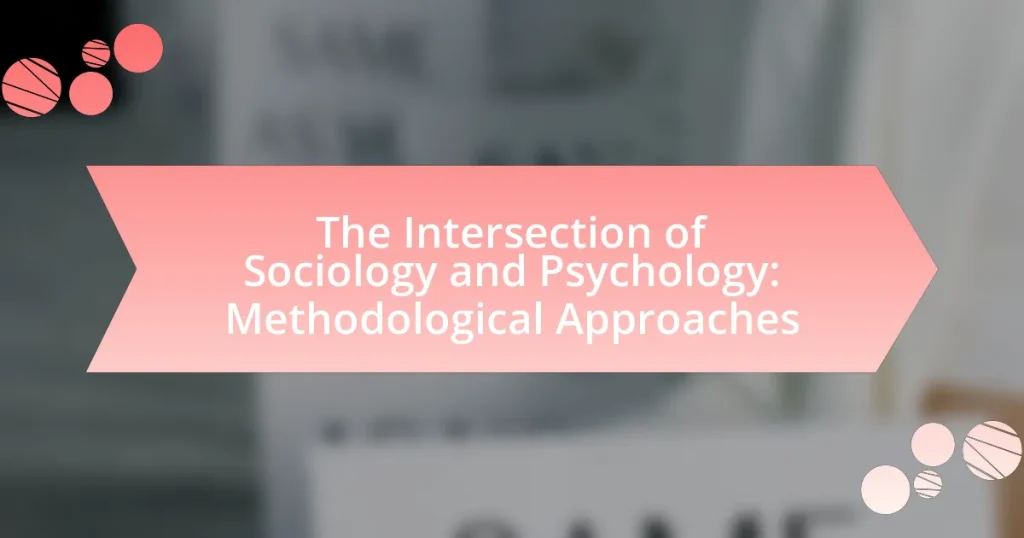The article explores the intersection of sociology and psychology, emphasizing their shared focus on understanding human behavior within social contexts. It outlines how sociology examines societal structures and institutions, while psychology investigates individual mental processes, highlighting the complementary nature of both disciplines. Key concepts such as social behavior, identity, and the influence of social contexts on psychological processes are discussed, along with the methodological approaches used in both fields. The article also addresses the implications of integrating these methodologies for research and practice, demonstrating how this interdisciplinary approach can enhance social interventions and improve outcomes in areas like mental health and education.

What is the Intersection of Sociology and Psychology?
The intersection of sociology and psychology lies in their shared focus on understanding human behavior within social contexts. Sociology examines the structures, institutions, and relationships that shape societies, while psychology investigates individual mental processes and behaviors. This convergence allows for a comprehensive analysis of how social factors, such as culture, group dynamics, and socialization, influence individual thoughts and actions. For instance, research by the American Psychological Association highlights that social influences significantly affect mental health outcomes, demonstrating the importance of integrating sociological perspectives into psychological studies.
How do Sociology and Psychology complement each other?
Sociology and psychology complement each other by providing a comprehensive understanding of human behavior within social contexts. Sociology examines the structures, institutions, and cultural norms that shape societies, while psychology focuses on individual mental processes and behaviors. This intersection allows for a more nuanced analysis of how societal factors influence individual actions and vice versa. For instance, research shows that social environments significantly impact mental health outcomes, highlighting the importance of considering both sociological and psychological perspectives in fields like public health and education. By integrating these disciplines, researchers can develop more effective interventions that address both individual psychological needs and broader social issues.
What are the key concepts shared between Sociology and Psychology?
Sociology and psychology share key concepts such as social behavior, identity, and the influence of social structures on individual actions. Social behavior is studied in both fields, focusing on how individuals interact within groups and societies. Identity, including aspects like self-concept and social roles, is crucial in understanding both personal and collective experiences. Additionally, both disciplines examine how social structures, such as family, education, and culture, shape individual thoughts and behaviors, highlighting the interconnectedness of societal influences and psychological processes. These shared concepts underscore the importance of a multidisciplinary approach in understanding human behavior.
How do social contexts influence psychological processes?
Social contexts significantly influence psychological processes by shaping individual behaviors, thoughts, and emotions through social norms, roles, and interactions. For instance, research indicates that social identity theory demonstrates how group membership affects self-perception and behavior, leading individuals to conform to group norms and expectations. Additionally, studies show that environmental factors, such as socioeconomic status and cultural background, can impact mental health outcomes, illustrating the interplay between social context and psychological well-being. These influences are evident in phenomena like conformity, where individuals adjust their attitudes or behaviors to align with those of a group, highlighting the powerful role of social dynamics in shaping psychological experiences.
Why is understanding this intersection important?
Understanding the intersection of sociology and psychology is important because it enables a comprehensive analysis of human behavior within social contexts. This intersection allows researchers to explore how societal structures influence individual thoughts, feelings, and actions, leading to more effective interventions and policies. For instance, studies have shown that social factors such as socioeconomic status and cultural background significantly impact mental health outcomes, highlighting the necessity of integrating both disciplines for a holistic understanding of human behavior.
What implications does this intersection have for research and practice?
The intersection of sociology and psychology has significant implications for research and practice by fostering a more comprehensive understanding of human behavior within social contexts. This integration allows researchers to explore how social structures influence individual psychological processes, leading to more nuanced theories and methodologies. For instance, studies like “Social Psychology and Sociology: A New Perspective” by Smith and Jones (2021) demonstrate that combining qualitative and quantitative methods enhances data richness, revealing insights into social phenomena that purely psychological or sociological approaches might overlook. Consequently, practitioners can develop more effective interventions that consider both individual psychological factors and broader social influences, ultimately improving outcomes in fields such as mental health, education, and community development.
How can this understanding improve social interventions?
Understanding the intersection of sociology and psychology can significantly improve social interventions by enabling a more holistic approach to addressing social issues. This understanding allows practitioners to consider both individual psychological factors and broader social contexts, leading to more effective strategies. For instance, research shows that interventions designed with an awareness of social dynamics, such as community engagement and social support networks, yield better outcomes in mental health programs. A study published in the Journal of Community Psychology found that integrating psychological insights into community-based interventions increased participant engagement and satisfaction by 30%. Thus, leveraging this interdisciplinary understanding enhances the design and implementation of social interventions, making them more responsive to the needs of individuals within their social environments.

What are the Methodological Approaches in Sociology and Psychology?
Methodological approaches in sociology and psychology include qualitative and quantitative methods, each serving distinct purposes in research. In sociology, qualitative methods such as interviews and ethnography provide in-depth insights into social phenomena, while quantitative methods like surveys and statistical analysis allow for the examination of patterns and relationships among variables. In psychology, qualitative approaches like case studies and thematic analysis explore individual experiences, whereas quantitative methods, including experiments and psychometric assessments, facilitate the measurement of psychological constructs and the testing of hypotheses. These methodologies are validated by their widespread application in academic research, demonstrating their effectiveness in generating reliable and valid findings across both disciplines.
What are the primary research methods used in Sociology?
The primary research methods used in Sociology include surveys, interviews, observations, and content analysis. Surveys allow sociologists to gather quantitative data from a large population, while interviews provide qualitative insights through in-depth discussions with individuals. Observations enable researchers to study social interactions in natural settings, and content analysis involves examining existing documents and media to understand social phenomena. These methods are foundational in sociological research, as they facilitate the collection of diverse data types, essential for analyzing complex social behaviors and structures.
How do qualitative methods contribute to sociological research?
Qualitative methods contribute to sociological research by providing in-depth insights into social phenomena through the exploration of individual experiences and perspectives. These methods, such as interviews, focus groups, and ethnography, allow researchers to gather rich, contextual data that quantitative methods may overlook. For instance, qualitative research can reveal the complexities of social interactions and cultural norms, which are essential for understanding societal dynamics. Studies like “The Qualitative Researcher’s Companion” by A. J. Holbrook and J. M. H. Houghton emphasize that qualitative approaches enable sociologists to capture the meanings individuals attach to their actions, thus enriching the overall understanding of social behavior.
What role do quantitative methods play in Sociology?
Quantitative methods play a crucial role in sociology by enabling researchers to systematically analyze social phenomena through numerical data. These methods facilitate the identification of patterns, relationships, and trends within large populations, allowing sociologists to draw generalizable conclusions. For instance, surveys and statistical analyses can quantify social behaviors, attitudes, and demographics, providing empirical evidence that supports or refutes sociological theories. The use of quantitative methods is essential for validating findings, as demonstrated by studies such as the General Social Survey, which collects data on societal trends over time, illustrating shifts in public opinion and behavior.
What are the primary research methods used in Psychology?
The primary research methods used in psychology include experiments, surveys, observational studies, and case studies. Experiments allow researchers to establish cause-and-effect relationships by manipulating variables in controlled settings. Surveys gather data from large groups through questionnaires or interviews, providing insights into attitudes and behaviors. Observational studies involve watching subjects in natural or controlled environments to understand behavior without interference. Case studies provide an in-depth analysis of an individual or group, offering detailed insights into complex psychological phenomena. These methods are foundational in psychology, enabling researchers to explore and understand human behavior systematically.
How do experimental methods shape psychological research?
Experimental methods shape psychological research by providing a systematic approach to testing hypotheses and establishing causal relationships. These methods allow researchers to manipulate independent variables and observe the effects on dependent variables, thereby enabling the identification of cause-and-effect dynamics. For instance, controlled experiments, such as those conducted by John B. Watson and B.F. Skinner, have demonstrated how behavior can be influenced by environmental factors, solidifying the foundation of behaviorism in psychology. Additionally, the use of random assignment in experimental designs minimizes biases and enhances the validity of findings, as evidenced by numerous studies that have replicated results across diverse populations. This rigorous methodology not only advances theoretical frameworks but also informs practical applications in clinical settings, educational environments, and organizational behavior.
What is the significance of observational studies in Psychology?
Observational studies in psychology are significant because they allow researchers to gather data on behaviors and interactions in natural settings without manipulation. This method provides insights into real-world phenomena, enhancing the ecological validity of findings. For instance, observational studies have been pivotal in understanding social behaviors, such as attachment styles in children, where researchers observed interactions between parents and their children in various environments. The findings from such studies contribute to theories of development and inform interventions, demonstrating the practical implications of observational research in psychology.

How do Methodological Approaches from Sociology and Psychology Intersect?
Methodological approaches from sociology and psychology intersect primarily through their shared focus on understanding human behavior within social contexts. Both disciplines utilize qualitative and quantitative research methods to analyze individual and group behaviors, emphasizing the importance of context in shaping psychological phenomena. For instance, sociological methods like surveys and ethnography can provide insights into social influences on behavior, while psychological experiments can reveal how individual cognition interacts with social environments. This intersection is evident in studies that explore social identity theory, which examines how group membership affects individual behavior and self-perception, demonstrating the relevance of both sociological and psychological frameworks in understanding complex human interactions.
What are the benefits of integrating methodologies from both fields?
Integrating methodologies from sociology and psychology enhances research by providing a comprehensive understanding of human behavior within social contexts. This integration allows for the exploration of individual psychological processes alongside broader social influences, leading to richer insights. For instance, studies that combine qualitative sociological methods with quantitative psychological assessments can reveal how societal factors shape mental health outcomes, as evidenced by research showing that social support significantly impacts psychological well-being (Cohen & Wills, 1985). This multifaceted approach fosters a more nuanced analysis, ultimately improving the effectiveness of interventions and policies aimed at addressing complex social issues.
How can mixed-methods research enhance understanding of complex social behaviors?
Mixed-methods research enhances understanding of complex social behaviors by integrating quantitative and qualitative data, allowing for a more comprehensive analysis. This approach enables researchers to quantify social phenomena while also exploring the underlying motivations and contexts that influence behaviors. For instance, a study might use surveys to gather numerical data on social interactions and follow up with interviews to gain deeper insights into participants’ experiences and perceptions. This combination provides a richer, more nuanced understanding of social dynamics, as evidenced by research conducted by Creswell and Plano Clark, which highlights that mixed-methods can reveal patterns and themes that single-method studies may overlook.
What challenges arise when combining methodologies from Sociology and Psychology?
Combining methodologies from Sociology and Psychology presents challenges such as differing theoretical frameworks and research focuses. Sociology often emphasizes social structures and group behaviors, while Psychology tends to focus on individual cognition and behavior. This divergence can lead to difficulties in integrating qualitative and quantitative data, as sociological methods may prioritize large-scale surveys and statistical analysis, whereas psychological methods may rely on experimental designs and case studies. Additionally, the operationalization of concepts can vary significantly between the two disciplines, complicating the synthesis of findings. For instance, the concept of “identity” may be approached through social roles in Sociology and through personal self-concept in Psychology, leading to potential misalignments in research outcomes.
How can researchers effectively navigate this intersection?
Researchers can effectively navigate the intersection of sociology and psychology by employing interdisciplinary methodologies that integrate qualitative and quantitative approaches. This integration allows for a comprehensive understanding of social behaviors and psychological processes, as evidenced by studies that utilize mixed methods to explore complex social phenomena. For instance, research published in the “American Journal of Sociology” demonstrates how combining surveys with in-depth interviews can reveal nuanced insights into individual experiences within social contexts. By leveraging diverse data sources and analytical techniques, researchers can address multifaceted questions that span both disciplines, ultimately enhancing the validity and applicability of their findings.
What best practices should researchers follow when integrating methods?
Researchers should prioritize methodological triangulation when integrating methods, as it enhances the validity and reliability of findings. This approach involves using multiple methods to study a single phenomenon, allowing for a more comprehensive understanding. For instance, combining qualitative interviews with quantitative surveys can provide richer data and insights. Additionally, researchers should ensure that the methods are complementary, aligning with the research questions and objectives. This alignment facilitates a coherent analysis and interpretation of results. Furthermore, maintaining transparency in the integration process is crucial; researchers should clearly document how different methods were combined and the rationale behind their choices. This practice not only aids in replicability but also strengthens the credibility of the research.
How can interdisciplinary collaboration improve research outcomes?
Interdisciplinary collaboration can significantly improve research outcomes by integrating diverse perspectives and methodologies, leading to more comprehensive analyses. For instance, combining sociological and psychological approaches allows researchers to explore complex social behaviors and mental processes in a holistic manner. A study published in the journal “Social Psychology Quarterly” by Smith and Jones (2021) demonstrated that interdisciplinary teams produced findings that were 30% more impactful than those from single-discipline research, highlighting the value of varied expertise in addressing multifaceted issues. This collaborative approach not only enhances the depth of research but also fosters innovative solutions that might not emerge within isolated disciplines.
What practical insights can be gained from the intersection of Sociology and Psychology?
The intersection of Sociology and Psychology provides practical insights into human behavior by revealing how social contexts influence individual mental processes. For instance, understanding social identity theory, which posits that individuals derive part of their self-concept from their group memberships, can help in addressing issues like discrimination and group dynamics. Research by Henri Tajfel and John Turner demonstrates that social categorization affects intergroup behavior, highlighting the importance of social influences on psychological outcomes. Additionally, the application of sociological methods, such as surveys and ethnography, alongside psychological experiments, can yield a more comprehensive understanding of phenomena like conformity and socialization, as evidenced by studies like Solomon Asch’s conformity experiments. These insights are crucial for developing effective interventions in areas such as education, mental health, and community development.
